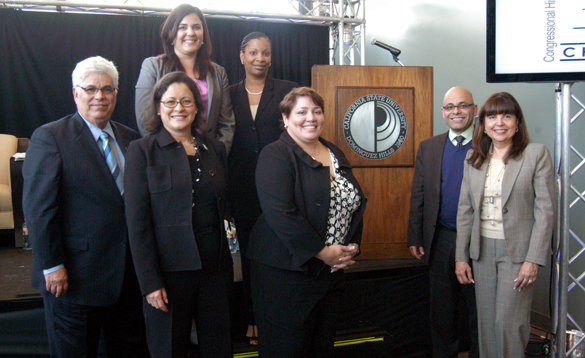A forum hosted by the Congressional Hispanic Caucus Institute (CHCI) was held in the fifth floor gallery of the University Library’s South Wing on April 8. Panel discussions featured stakeholders from the academic and policymaking arenas. Dr. Irene Vasquez, chair of the Academic Senate, welcomed the attendees to the university on behalf of President Mildred García and pointed out the significance of hosting CHCI’s meeting at Dominguez Hills.
“CSU Dominguez Hills educates a large percentage of Latino and African American students in the CSU system,” said Vasquez. “In 2010, 41 percent of the student population was Latino. And [it] is the only state university in the system, and perhaps in the country, that has a Latina president, a Latina faculty president, and a Latina student president.”
CHCI president Esther Aguilera introduced a video message from U.S. Secretary of Education Arne Duncan and spoke on the growth of Latinos in public policy and education since CHCI’s inception in 1978, in part due to the organization’s internships and fellowships.
“At the time, there were only five Latino members of Congress,” she said. “Today, on our board, we have over 25 Latino members of Congress. Our mission is very simple. They wanted to break down the barriers in the halls of Congress and have more young Latinos working on Capitol Hill and get the training to be at the legislative table.”
According to Aguilera, 58 percent of all population growth in the last ten years has been due to the Latino community.
“The number we really should be talking about is Latinos under 18 are already 23 percent of the population,” she said. “They are our future. We can’t wait for the young people to grow up to start tackling the serious demographic implications to the nation that this [number] represents. The strength of this country is tied to the success of the U.S. Latino community.”
A panel titled, “Keeping the Promise: Determined to Lead, Compete, and Succeed” was moderated by

Haynes spoke about the use of the CSU’s “How to Get to College” initiative, which is used to educate all parents of college-bound children in 17 different languages, including Spanish. Estrada spoke on Univision’s “La Feria Deja Huella,” (Leave Your Mark Fair) which has been hosted annually at CSU Dominguez Hills since 2009.
David Gamboa, director of government and community relations at CSU Dominguez Hills, says that “As a Hispanic-Serving Institute, CSU Dominguez Hills collaborates well with our external partners in identifying methods in elevating the importance of why higher education is a necessity, especially in the Hispanic community. CHCI is a valued entity when it comes to its outreach efforts.”
A second panel on “Keeping the Promise: Creating Access and Accountability” was facilitated by Arturo Vargas, executive director of NALEO Educational Fund, who led the discussion by Jose Rico, along with John Mockler, former executive director of the California State Board of Education; David Sanchez, president of the California Teachers Association; Suzanne Elise Walsh, senior policy program officer for postsecondary improvement at the Bill & Melinda Gates Foundation; and Maria Elena Yepes, member of the Los Angeles County Board of Education.
Secretary Duncan’s video message pointed out the achievement gap for Latinos, wherein only 62 percent of Hispanic young adults have earned a high school diploma and only 13 percent of them have completed a bachelor’s degree. He also cited Obama’s investments to increase access and affordability to higher education, particularly an increase of $5,550 for Pell Grants and $920 million to improve federal TRIO programs.
“The Hispanic community plays a critical role in our future workforce needs and our growing economy,” Duncan said in the video. “Hispanics are the youngest and fastest-growing minority group, but there remains a significant gap between [them] and other groups. To compete in this 21st Century, globally dependent economy and restore our role as the global leader in education, we have to do better. We need to invest in strengthening and expanding educational opportunities for all students.”
For more information on the Congressional Hispanic Caucus Institute, click here.